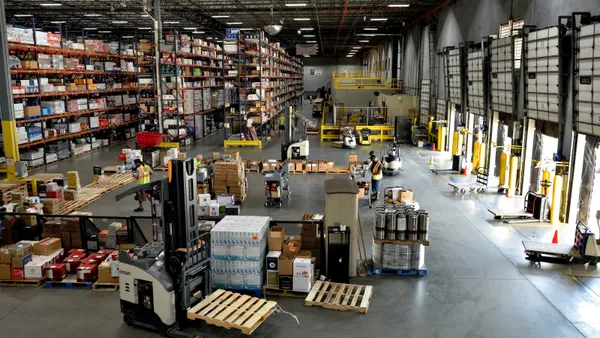Dive Brief:
- Supply chain intelligence company Dsco on Wednesday announced the Dsco 444, the industry's first ranking of the top drop shipping brands in today’s retail supply chain.
- Rankings are earned by performance via virtual communication and physical fulfillment. Through the list, brands will be able to compare themselves with others in the field and consider areas of improvement to increase revenue and lower costs.
- Dsco intends to produce a biannual ranking of drop shippers through details regarding their algorithmic scores and actual results. Brands like Hugo Boss and Lacoste were named among the top ten drop shippers in the inaugural ranking.
Dive Insight:
Drop shippers now have access to beneficial benchmarking information, to learn where they rank and if, or how, they need improvement.
Benchmarking can help organizations identify areas of improvement across the entire value chain. The process can identify best practices not currently used by taking a birds-eye-view approach to operational efficiency, support industry-wide improvement initiatives, as when a successful practice by one supplier becomes universal. As a result, benchmarking through lists is useful for any link in the supply chain, from suppliers to ports to technology providers.
However, drop shippers may benefit most from such a list, given their rising prominence for retailers. Today, drop shipping is a core competency in the retail supply chain. Today, consumers demand products arrive at their doorstep well-packaged and within days of order. By relying on a drop shipper, retailers can avoid storing a branded product at a warehouse, and simply communicate the order to a brand who then ships a product directly. In a new world of mutlichannel sales, a brand's ability to claim a top spot among the "best" drop shippers may actually mean more business.
"Before now, suppliers haven't had any visibility about their drop shipping performance versus their peers," Dsco CEO Jeremy Hanks told Supply Chain Dive. "Using Dsco's data, those suppliers can now have access to tangible data they can use to improve their drop shipping and data sharing programs, improving the retail supply chain as a whole."
Ultimately, access to benchmarking is a boon for any industry seeking growth and improvement. The opportunity to consider best practices among competitors that would otherwise remain inaccessible can only enhance refinements in performance.













